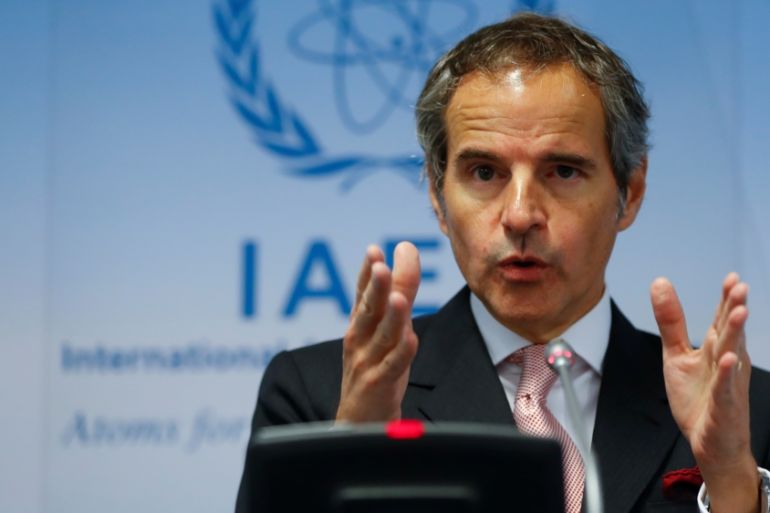Head of UN atomic energy watchdog to make first trip to Iran
Rafael Mariano Grossi to visit Tehran on Monday in first trip since he became the IAEA’s director general in December.

The head of the United Nations atomic watchdog will go to Tehran on Monday for meetings with senior Iranian officials aimed at improving cooperation on Iran’s nuclear activities.
The visit announced on Saturday comes amid tensions between the United States and its European allies over Washington’s bid to maintain an arms embargo on Iran and reimpose UN sanctions dating back to 2006.
Keep reading
list of 4 itemsBombs and viruses: The shadowy history of Israel’s attacks on Iranian soil
Russia says Ukraine attack hits Zaporizhzhia nuclear power plant
Nuclear energy cannot lead the global energy transition
It will be the first trip to Iran by Rafael Mariano Grossi since he became director general of the International Atomic Energy Agency (IAEA) in December last year.
The IAEA said in a statement Grossi will address Iran’s cooperation with the agency, particularly access for its inspectors to certain sites.
I will travel to Tehran on Monday for meetings with Iranian authorities to address outstanding questions related to safeguards in Iran. I hope to establish a fruitful and cooperative channel of direct dialogue. It is necessary. pic.twitter.com/nkF0X8A4ZM
— Rafael MarianoGrossi (@rafaelmgrossi) August 22, 2020
“My objective is that my meetings in Tehran will lead to concrete progress in addressing the outstanding questions that the agency has related to safeguards in Iran and, in particular, to resolve the issue of access,” he said.
“I also hope to establish a fruitful and cooperative channel of direct dialogue with the Iranian government which will be valuable now and in the future.”
|
|
His visit will take place shortly before a September 1 meeting in Vienna of the joint commission on a 2015 deal between Iran and global powers that aims to prevent Tehran from developing a nuclear bomb.
The Iranian delegation to international organisations in the Austrian capital tweeted that “we hope this visit will lead to reinforced mutual cooperation”.
Since US President Donald Trump unilaterally pulled Washington out of the nuclear deal with Tehran in 2018, the other signatories – France, United Kingdom, Germany, Russia and China – have been struggling to keep it alive.
Known as the Joint Comprehensive Plan of Action, or JCPOA, the deal promises Iran economic incentives in exchange for curbs on its nuclear programme.
Iran’s economy has been steadily deteriorating under the weight of reimposed US sanctions and Tehran has begun scaling back its commitments to the agreement to try to pressure the other countries to do more to offset Washington’s punishing measures.
At the same time, Iran has continued to provide IAEA inspectors with access to its nuclear facilities – one of the major reasons the countries still party to the agreement stress it is important to keep it alive.
Last week, the US ratcheted up the pressure, officially informing the UN it was demanding the restoration of all UN sanctions on Iran, arguing that Tehran is in non-compliance and invoking a provision of the nuclear deal to “snap back” even more sanctions.
Russia, China, Britain, France and Germany, who often disagree, all declared the US action illegal, arguing it is impossible to withdraw from a deal and then use the resolution that endorsed it to reimpose sanctions.